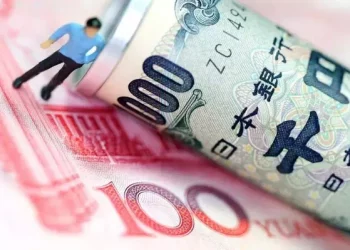Federal Reserve Bank of Chicago President Austan Goolsbee on Thursday issued a blunt critique of the current administration’s tariff policies, warning that they risk causing a “stagflationary shock” that could complicate the Federal Reserve’s ability to respond effectively.
Speaking at a fireside chat hosted by the Economic Club of New York, Goolsbee described tariffs as a “negative supply shock,” akin to stagflation, where the economy experiences slow growth combined with high inflation—an exceptionally challenging scenario for central banks. “There’s not a generic playbook for how a central bank should respond to a stagflationary shock,” he said.
Stagflation, which was last seen in the 1970s and early 1980s, presents a difficult situation for the Fed, as its traditional tools to control inflation—such as raising interest rates—could exacerbate unemployment, and vice versa. Goolsbee’s comments were especially noteworthy because Federal Reserve officials typically avoid commenting on presidential policies, particularly those of President Donald Trump.
The backdrop for Goolsbee’s comments was Trump’s sudden decision to pause reciprocal tariffs on dozens of countries, just hours after imposing them, while significantly increasing tariffs on Chinese imports to a striking 145%. China retaliated by raising its tariffs on U.S. goods to 84%. National Economic Council Director Kevin Hassett confirmed that the 10% baseline tariff on most imports would remain in place.
Goolsbee noted that the new tariffs are more aggressive than the Chicago Fed economists had anticipated, with scenarios predicting 10% tariffs globally and a 25% tariff on Chinese imports. Despite this, Goolsbee stressed that the “hard data” on inflation and unemployment suggests the economy is currently stable, with unemployment near 4% and inflation at 2.4%, which was celebrated by the Trump administration as a sign of improving economic conditions.
However, Goolsbee warned that the combination of slow economic growth, rising prices, and growing anxiety over potential pandemic-era disruptions is creating a “iron triangle of uncertainty” for businesses. In particular, companies in his district, including parts of the domestic auto industry, are fearful of a return to uncontrolled inflation, which could drive further instability.
The Chicago Fed President also underscored the importance of the Fed’s independence in responding to future economic challenges. He emphasized that the central bank’s ability to manage potential inflation or unemployment spikes would be severely hampered by political interference. Goolsbee referenced former Fed Chair Paul Volcker’s tough decisions to raise interest rates to combat inflation during the 1980s, pointing out that such measures would be far harder in the face of political pressure.
“Sometimes the Fed has to do the hard job,” Goolsbee concluded, reinforcing the need for the Fed’s independence in carrying out its mandate to maintain economic stability.
Related Topics:
























